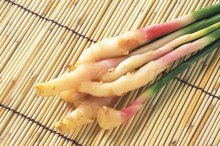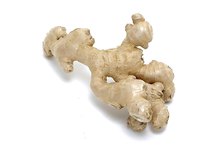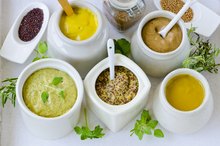Side Effects of Using Spices While Taking Coumadin
Coumadin is a brand-name for the drug warfarin and is prescribed to patients at risk for blood clots. It is an anticoagulant and designed to thin the blood. If you are taking Coumadin, it must be taken as prescribed and you will need to have regular blood tests taken in order to monitor your international normalized ratio, or INR. You will also need to be aware of certain foods and spices that work as natural blood thinners and can put you at a higher risk for bleeding and bruising.
If you are experiencing serious medical symptoms, seek emergency treatment immediately.
Cayenne Pepper
Cayenne pepper is a hot food spice that is used in many different kinds of cuisine. Its main chemical substance is capsaicin, which is known for its pain-relieving qualities. According to the University of Maryland Medical Center, cayenne pepper can increase the blood thinning properties of Coumadin and may increase your risk of bruising and bleeding 3. If your diet consists of foods that use a lot of cayenne pepper, let your physician know so he can possibly adjust your Coumadin levels with this in mind.
- Cayenne pepper is a hot food spice that is used in many different kinds of cuisine.
- According to the University of Maryland Medical Center, cayenne pepper can increase the blood thinning properties of Coumadin and may increase your risk of bruising and bleeding 3.
Ginger
Can Certain Fruits and Vegetables Reduce Blood Clots?
Learn More
Ginger, or ginger root, is an herb that is used in Asian and Indian cuisine very frequently. It is also used to treat nausea, stomachaches, and joint and muscle pain. Ginger also works as a natural blood thinning agent and, when eaten in large doses with Coumadin, can increase your chances of bleeding and bruising. MedlinePlus recommends having your blood levels tested regularly if your diet is high in ginger and you are on Coumadin 45.
- Ginger, or ginger root, is an herb that is used in Asian and Indian cuisine very frequently.
- Ginger also works as a natural blood thinning agent and, when eaten in large doses with Coumadin, can increase your chances of bleeding and bruising.
Turmeric
Turmeric is a main spice used in most curry dishes. It has a bitter taste and is also used to flavor mustard. In a medicinal nature, turmeric is used to treat heartburn, headaches, fibromyalgia and topically for inflammatory skin conditions, according to MedlinePlus 45. This is another spice that is a natural blood thinner and when eaten in large quantities while taking Coumadin, your chances of bruising and bleeding are increased. You should monitor your intake of turmeric and let your physician know if it is a regular spice used in your diet.
- Turmeric is a main spice used in most curry dishes.
- This is another spice that is a natural blood thinner and when eaten in large quantities while taking Coumadin, your chances of bruising and bleeding are increased.
Garlic
Why Is Taking Coumadin & Cranberry Juice or Tablets Harmful Together?
Learn More
Garlic is one of the most used herbs for seasoning in the American diet. Garlic also has great medicinal value and is believed to benefit the heart and blood system in many different ways. Garlic produces the chemical allicin, which is the chemical that is believed to provide the most medicinal benefit. If garlic is a large part of your diet, it will be very important to let your physician know so she can adjust your Coumadin level and reduce your risk of bleeding and bruising.
- Garlic is one of the most used herbs for seasoning in the American diet.
- Garlic produces the chemical allicin, which is the chemical that is believed to provide the most medicinal benefit.
Considerations
When it comes to Coumadin, it is very important to follow your dose as prescribed and to let your physician know about your regular diet and any supplements you may be taking. If any of these spices are regular components of your diet, let your doctor know so your medication level can be adjusted. Even if these spices are only occasionally used, it is still a good idea to talk to your doctor about them and to have your blood levels checked regularly.
Related Articles
References
Writer Bio
Deborah Lundin is a professional writer with more than 20 years of experience in the medical field and as a small business owner. She studied medical science and sociology at Northern Illinois University. Her passions and interests include fitness, health, healthy eating, children and pets.









